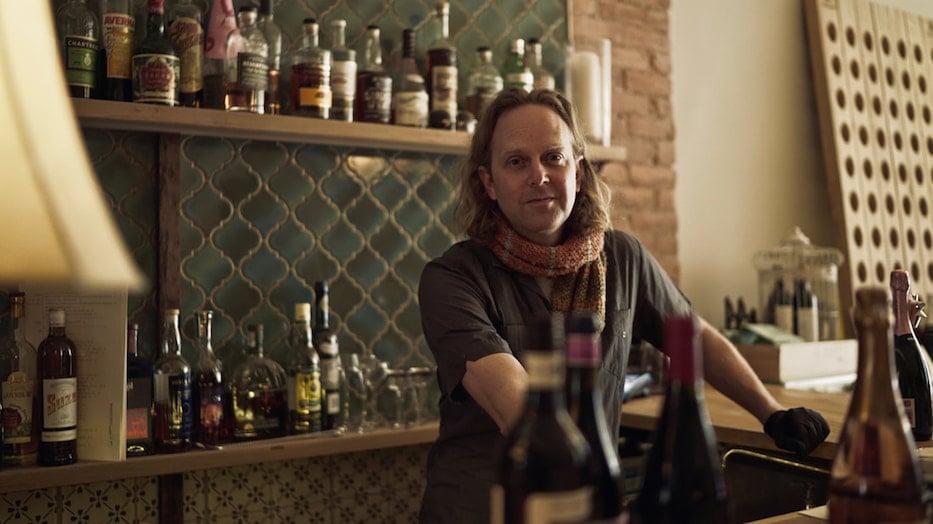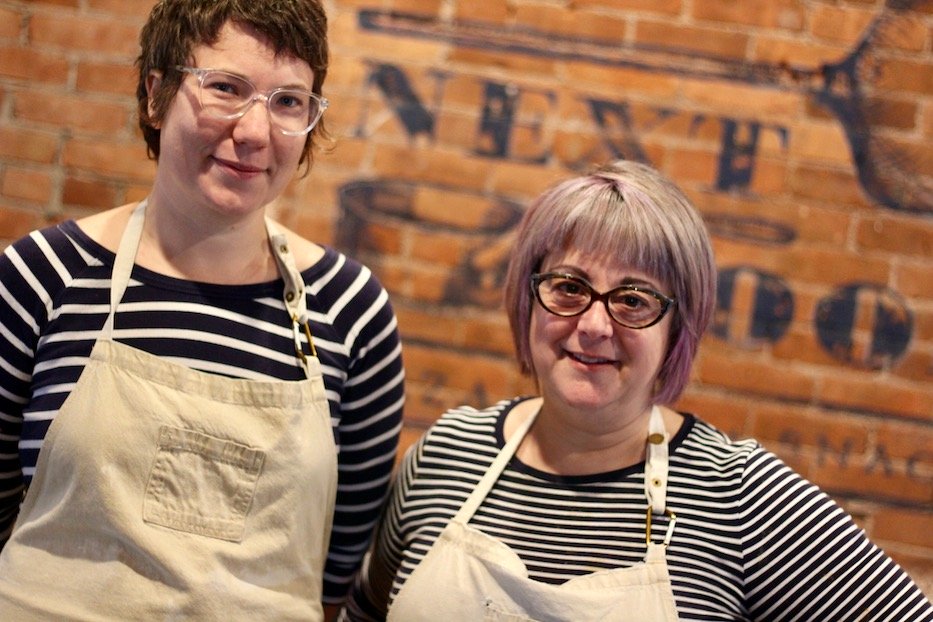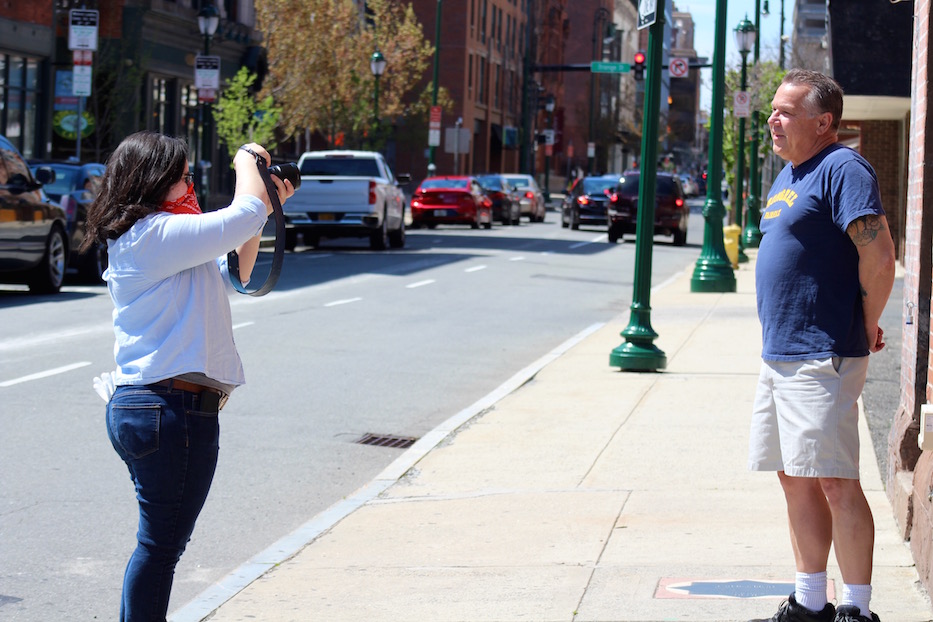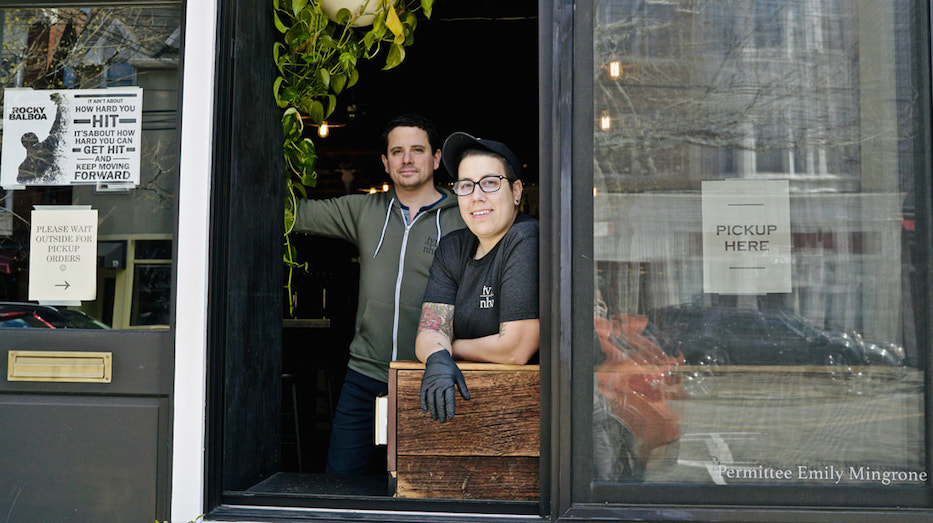
Photography | Arts & Culture | Culinary Arts | COVID-19

| Andrew Hotis at August, which he owns and operates on Edwards Street with his wife Michelle Chadwick-Hotis. Lisa Tedesco Photo. |
Chef Andrew Hotis stands at the bar, arms outstretched. One hand sits on the counter, clam-shaped and foreign in a black latex glove. The other hovers somewhere behind a line of jars and bottles. They crowd the frame: liquors the color of honey and preserved amber, taller ones of red and rose that stand, still corked, at attention.
But there are no customers here. It is business not as usual. Around Hotis, the bar is quiet enough to hear a pin drop.
Hotis, who runs the Edwards Street wine bar August with his wife Michelle Chadwick-Hotis, is the latest subject of “Unstill Life,” a new collaboration between filmmaker Lisa Tedesco and Next Door New Haven co-owner and chef Robin Bodak. The series, which launched in April, documents New Haven business owners in their shops, where the hustle and bustle of pre-coronavirus life has come to a screeching halt.
A new photo, accompanied by an interview, appears on Next Door’s blog each week. Recent subjects have included the Coffee Pedaler’s Ryan Taylor, August owners Hotis and Chadwick-Hotis, Cafe Nine’s Paul Mayer, and Emily Mingrone and Shane McGowan of Tavern on State. Many are businesses that Tedesco knows not in her work as a filmmaker, but as a resident of State Street.
“It feels cathartic,” she said in a recent interview. “Like, I have a purpose with my camera. It’s not just sitting there in the closet. The idea is very community based … just having people see that our New Haven businesses are here for them.”

| Next Door chefs Chelsea Peterson and Robin Bodak in September 2019. Lucy Gellman File Photo. |
The two were inspired to start the series in March, after bars, restaurants, theaters and gyms closed their doors by state order. The restaurant closed down and announced it would not be doing take out (although it is still offering gift cards, t-shirts, and growlers). For the first time in decades, Bodak didn’t have a kitchen to report to. She was still, and she hated it.
“I couldn’t be open,” she said. “I didn’t feel active. I was super uncomfortable just sitting around.”
Late one night, she spotted the project “Behind Closed Doors” from Maine-based photographer Nicole Wolf. In that series, families and business owners crowd behind the closed doors—or windows, or occasionally plastic curtains—of their homes and businesses, looking out at a changed world.
In New Haven, she had also been keeping her eye on Chris Randall’s ongoing “Porch-Ritz” project, which depicts New Haveners on their front stoops, steps, balconies and porches. The longer COVID-19 closures have gone on, the more she said she has thought about the amount of hurt in the restaurant industry—and in small businesses more broadly.
“It’s sort of hard to pick out one area that is suffering more than any other,” she said. “I feel for everybody. Personally, I have to compartmentalize, because it’s completely overwhelming. I hope this is something positive for people. For me, it’s me taking care of the industry I report in.”
She put a notice out on social media: would a photographer be willing to contribute their time and craft to something similar, but for small businesses? Tedesco, who is the founder of Lady Film Media, replied almost immediately.
She has a soft spot for Bodak and for the restaurant, which has become one of her favorite places to go with her wife since it opened in 2018. In those early days of Next Door, Tedesco recalled, Bodak found her way over to their table and chatted. The conversation jumped from the food to Tedesco’s work, which is dedicated to amplifying voices in women- and LGBTQ+-run cinema. They’ve been friends since. Last fall, the restaurant hosted a screening of Tedesco’s film House of La Reine.

| Lisa Tedesco with Cafe Nine owner Paul Mayer. Lucy Gellman Photo. |
So when the filmmaker saw a way to prop up both Next Door and many of the restaurants she’s come to love, she jumped in. Like most of the creative sector, her industry is largely on hold—festivals are moving online and even a small film requires “20 to 25 crew members up each others’ asses,” which is not possible—and this was a way to give back.
She noted that like Bodak, she’s also seen similar examples coming up in black-and-white portraiture and street photography, particularly in hard-hit areas of Manhattan. In addition to “Unstill Life,” she’s been thinking about an at-home film series, where viewers get the same webcam-like view into someone's life for several days on end.
“The creative mind has to find a way to like, churn,” she said. “I know for me, I’m popping out screenplays left and right because of this. Everyone’s just trying really hard to just gather the community together and make things more positive.”
Since starting the series, Tedesco has learned to shoot while following physical distancing guidelines. Now, she shows up to assignments in a mask or bandana and latex gloves and makes sure to keep her distance. Her wife carries hand sanitizer and extra supplies.
Around her, she said, businesses keep jumping out from the woodwork. Some are closed for the foreseeable future; others have been offering take out and delivery service to keep some revenue coming in. Each has endeared itself to her during her time as a resident of State Street.
There’s August, where a Vespa used to sit propped outside like an invitation. There’s Marjolaine Pastry Shop, where owner Arlene Cardenas has become a one-woman baking show in the kitchen, but new rules govern the shop and its masked clientele. Or Buca Trattoria, where owner Giuseppe Cinque comes from the same region of Italy as Tedesco’s father, and can hold down a spirited argument about soccer while churning out fresh pasta.
And of course there’s Next Door, where Bodak is still trying to figure out what a new normal might look like. She said she’s still hesitant to let Tedesco photograph her, but might show up in the series one week soon.

| Emily Mingrone (foreground) and Shane McGowan of Tavern on State. Lisa Tedesco Photo. |
“For me, it was awesome that Lisa wanted to step up and do this,” she said. “This is a legitimate artist. The truth is, she’s amazing … when things come together like this, I feel so lucky. I feel lucky that it happened. I feel lucky that Lisa responded, I feel lucky that she’s in my life. It’s meaningful.”
In the images, she added, Tedesco has captured the spirit of so many of the city’s small businesses. She said that the series has reminded her how many businesses are in that boat, trying to figure out how to stay afloat and keep their staff and their customers safe.
“When we come back, it’s not gonna be what it was before,” she said. “It can’t be. Honestly, I have no idea what it will look like or what it’s gonna be. I think that you can’t define it, and you just need to be able to flow. You’ll start one way, and it will evolve into what’s necessary.”
That uncertainty permeates the photos, but it loses out to a resolve to come back every time. From August, Hotis looks out at Tedesco, tired but still there, missing the customers who used to pack in for unfussy food and wine. At Tavern on State, Mingrone and McGowan stand at a window, framed in the wide rectangle of its mouth. Against all odds, both of them seem close to smiling.
On a recent Saturday, she sat in the middle of a sun-drenched Crown Street, photographing Cafe Nine owner Paul Mayer. For years, she’s frequented the venue for its annual New Year’s Eve bash. As she photographed, Mayer praised the series for shedding light on the fact that business owners are still very much present, even if their doors may be closed.
As he figures out what reopening may look like, he has kept a virtual tip jar open for staff. Thus far, the venue has raised about $15,000, meaning that every employee has gotten about $1,000.
“It took a little time to get a handle on what was actually happening and how long this was going to go on, but I’ve started to come to terms with it,” he said as Tedesco took a shot from across the street. “I don’t anticipate it coming back until there is a vaccine. I think we’re just going to take steps forward as we can.”
To view the series, visit Next Door's blog.

